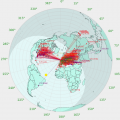jks
About
- Username
- jks
- Joined
- Visits
- 36,263
- Last Active
- Roles
- Member, Administrator, Moderator
- Points
- 640
Reactions
-
KPH - Snubs
-
v1.390: cross compilation, SAM demodulators
-
v1.390: cross compilation, SAM demodulators
-
v1.390: cross compilation, SAM demodulators
-
v1.390: cross compilation, SAM demodulators
-
v1.390: cross compilation, SAM demodulators
From the "I'm not working on it except when it interests me" department:
I'm interested in feedback about the SAM demods from the BCB DX crowd. But remember that this code is just lifted from wdsp and I don't know much about it. There are some tunable PLL parameters that could potentially be optimized. Please read the Kiwi operation manual for full details: kiwisdr.com/quickstart/index.html#id-faq-samv1.390 April 23, 2020 Performance improvements: Suggested by @howardsu on Kiwi forum: remove -DDEBUG so assert()'s are not evaluated. Added new "make debug" target to revert to compiling with -DDEBUG defined. Christoph's cross-compilation changes: added "make xc" target that allows cross-compiling on development host. Alternative to slow compiles on Beagle during development. See file CROSS_COMPILE for complete details. Added synchronous AM (SAM) demodulators from Warren Pratt's wdsp package via the Teensy-ConvolutionSDR implementation: github.com/DD4WH/Teensy-ConvolutionSDR See the Kiwi operation manual for more information: kiwisdr.com/quickstart/index.html#id-faq-sam Synchronous AM modes: SAM, SAL, SAU, SAS User interface changes: Use keyboard shortcut 'A' to toggle the SAM modes (sorry, 's' and 'S' were taken). As always type 'h' or '?' to see the list of all keyboard shortcuts. Bugfix: Adjusting the passband via a "/width" or "/low,high" entry in the frequency box is now "sticky" i.e. remembered when returning to the mode. Just like when changing the passband via the 'p' and 'P' keyboard shortcuts. Restore as usual by shift-clicking on the mode button. -
v1.390: cross compilation, SAM demodulators
From the "I'm not working on it except when it interests me" department:
I'm interested in feedback about the SAM demods from the BCB DX crowd. But remember that this code is just lifted from wdsp and I don't know much about it. There are some tunable PLL parameters that could potentially be optimized. Please read the Kiwi operation manual for full details: kiwisdr.com/quickstart/index.html#id-faq-samv1.390 April 23, 2020 Performance improvements: Suggested by @howardsu on Kiwi forum: remove -DDEBUG so assert()'s are not evaluated. Added new "make debug" target to revert to compiling with -DDEBUG defined. Christoph's cross-compilation changes: added "make xc" target that allows cross-compiling on development host. Alternative to slow compiles on Beagle during development. See file CROSS_COMPILE for complete details. Added synchronous AM (SAM) demodulators from Warren Pratt's wdsp package via the Teensy-ConvolutionSDR implementation: github.com/DD4WH/Teensy-ConvolutionSDR See the Kiwi operation manual for more information: kiwisdr.com/quickstart/index.html#id-faq-sam Synchronous AM modes: SAM, SAL, SAU, SAS User interface changes: Use keyboard shortcut 'A' to toggle the SAM modes (sorry, 's' and 'S' were taken). As always type 'h' or '?' to see the list of all keyboard shortcuts. Bugfix: Adjusting the passband via a "/width" or "/low,high" entry in the frequency box is now "sticky" i.e. remembered when returning to the mode. Just like when changing the passband via the 'p' and 'P' keyboard shortcuts. Restore as usual by shift-clicking on the mode button. -
KiwiSDR production status and availability
-
v1.390: cross compilation, SAM demodulators
From the "I'm not working on it except when it interests me" department:
I'm interested in feedback about the SAM demods from the BCB DX crowd. But remember that this code is just lifted from wdsp and I don't know much about it. There are some tunable PLL parameters that could potentially be optimized. Please read the Kiwi operation manual for full details: kiwisdr.com/quickstart/index.html#id-faq-samv1.390 April 23, 2020 Performance improvements: Suggested by @howardsu on Kiwi forum: remove -DDEBUG so assert()'s are not evaluated. Added new "make debug" target to revert to compiling with -DDEBUG defined. Christoph's cross-compilation changes: added "make xc" target that allows cross-compiling on development host. Alternative to slow compiles on Beagle during development. See file CROSS_COMPILE for complete details. Added synchronous AM (SAM) demodulators from Warren Pratt's wdsp package via the Teensy-ConvolutionSDR implementation: github.com/DD4WH/Teensy-ConvolutionSDR See the Kiwi operation manual for more information: kiwisdr.com/quickstart/index.html#id-faq-sam Synchronous AM modes: SAM, SAL, SAU, SAS User interface changes: Use keyboard shortcut 'A' to toggle the SAM modes (sorry, 's' and 'S' were taken). As always type 'h' or '?' to see the list of all keyboard shortcuts. Bugfix: Adjusting the passband via a "/width" or "/low,high" entry in the frequency box is now "sticky" i.e. remembered when returning to the mode. Just like when changing the passband via the 'p' and 'P' keyboard shortcuts. Restore as usual by shift-clicking on the mode button. -
v1.390: cross compilation, SAM demodulators
From the "I'm not working on it except when it interests me" department:
I'm interested in feedback about the SAM demods from the BCB DX crowd. But remember that this code is just lifted from wdsp and I don't know much about it. There are some tunable PLL parameters that could potentially be optimized. Please read the Kiwi operation manual for full details: kiwisdr.com/quickstart/index.html#id-faq-samv1.390 April 23, 2020 Performance improvements: Suggested by @howardsu on Kiwi forum: remove -DDEBUG so assert()'s are not evaluated. Added new "make debug" target to revert to compiling with -DDEBUG defined. Christoph's cross-compilation changes: added "make xc" target that allows cross-compiling on development host. Alternative to slow compiles on Beagle during development. See file CROSS_COMPILE for complete details. Added synchronous AM (SAM) demodulators from Warren Pratt's wdsp package via the Teensy-ConvolutionSDR implementation: github.com/DD4WH/Teensy-ConvolutionSDR See the Kiwi operation manual for more information: kiwisdr.com/quickstart/index.html#id-faq-sam Synchronous AM modes: SAM, SAL, SAU, SAS User interface changes: Use keyboard shortcut 'A' to toggle the SAM modes (sorry, 's' and 'S' were taken). As always type 'h' or '?' to see the list of all keyboard shortcuts. Bugfix: Adjusting the passband via a "/width" or "/low,high" entry in the frequency box is now "sticky" i.e. remembered when returning to the mode. Just like when changing the passband via the 'p' and 'P' keyboard shortcuts. Restore as usual by shift-clicking on the mode button.







